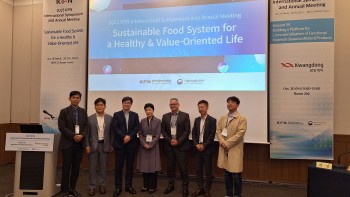Nov 17, 2023
The first two health functional food (HFF) claims, with extracts using New Zealand velvet, have now been approved by Korea’s food safety authorities, aimed at improving prostate function and anti-fatigue. It is also the start of an exciting new era for New Zealand velvet in its top market.

New Zealand velvet was prominent at the Korean Food Science and Nutrition symposium. Rhys Griffiths (third from right) attended on behalf of DINZ and is pictured with some of the symposium’s presenters and moderators.
The two newly-approved claims were announced by the Korean Kwangdong Pharmaceutical health food company at the Korean Society of Food Science and Nutrition (KFN)’s research symposium in Busan on 20 October.
The ‘Sustainable Food Systems for Healthy and Value-Oriented Life’ symposium was attended by 2,300 delegates from science and industry, including representatives from key health food customers for New Zealand velvet – KGC, Kwangdong, Yuhan Care and HY, the Korean version of the Yakult probiotic drink. The audience also included DINZ Korean representative JongKyu Jang and markets manager Rhys Griffiths, who was up in South Korea for a week-long visit.
Despite Asia’s ancient tradition of using deer antlers to promote rapid healing, growth in children and blood flow, research results through clinical trials were lacking, Kwangdong’s senior researcher JinSoo Kim told the symposium. The company’s clinical research has focused on new complex extracts, containing New Zealand velvet, targeting prostate function, anti-fatigue and growth in children, among others.
After visiting New Zealand in 2017, Kwangdong selected New Zealand velvet, which met its stringent grading and quality specifications for health functional food (HFF) products. Through clinical trials, the company began investigating the potential of using New Zealand velvet as an ingredient used in several complex HFF products.
Human clinical trials for the new prostate function extract had showed good results especially for improved urinary flow rate, for dosages of 500 milligrams and 1,000 mg per day, when compared to a placebo group over a period of 12 weeks, Kwangdong scientist KiWong Lee reported. The dosage was also well tolerated.
In July, the Korean Ministry of Food and Drug Safety (MFDS), approved the prostate function and anti-fatigue claims made by Kwangdong, which were backed by peer-reviewed results. As a result, Kwangdong can now use these claims in their new products launching next year.
Kwangdong expects it to serve as a starting point for future deer antler-related business.
“It’s a big thumbs up for the new DINZ strategy of targeting health food products,” says Griffiths, adding other Korean health food companies are also exploring opportunities for New Zealand velvet and he expects to see more claims approved in the future.
Health functional food supplements – estimated by Kantar research conducted for NZ Trade & Enterprise (NZTE) to be worth around NZ$6 billion in the Korean market in 2022 – are one of the three legs of DINZ’s velvet strategy to lift farmgate returns. The other two are healthy foods and traditional medicine.
During his market visit, Griffiths also met with other key partners for New Zealand velvet, including the Korean Ginseng Corporation (KGC) and Yuhan Care, other traditional buyers and MFDS.

